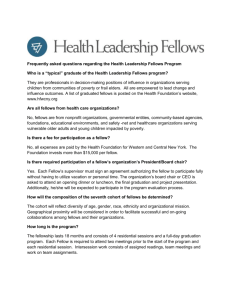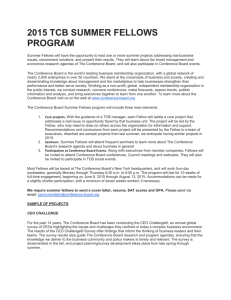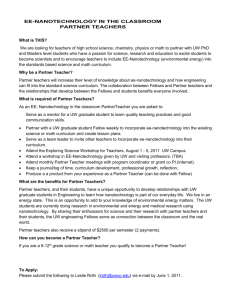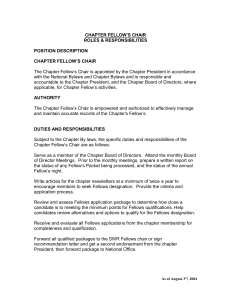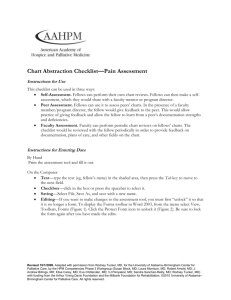Transplant Hepatology
advertisement
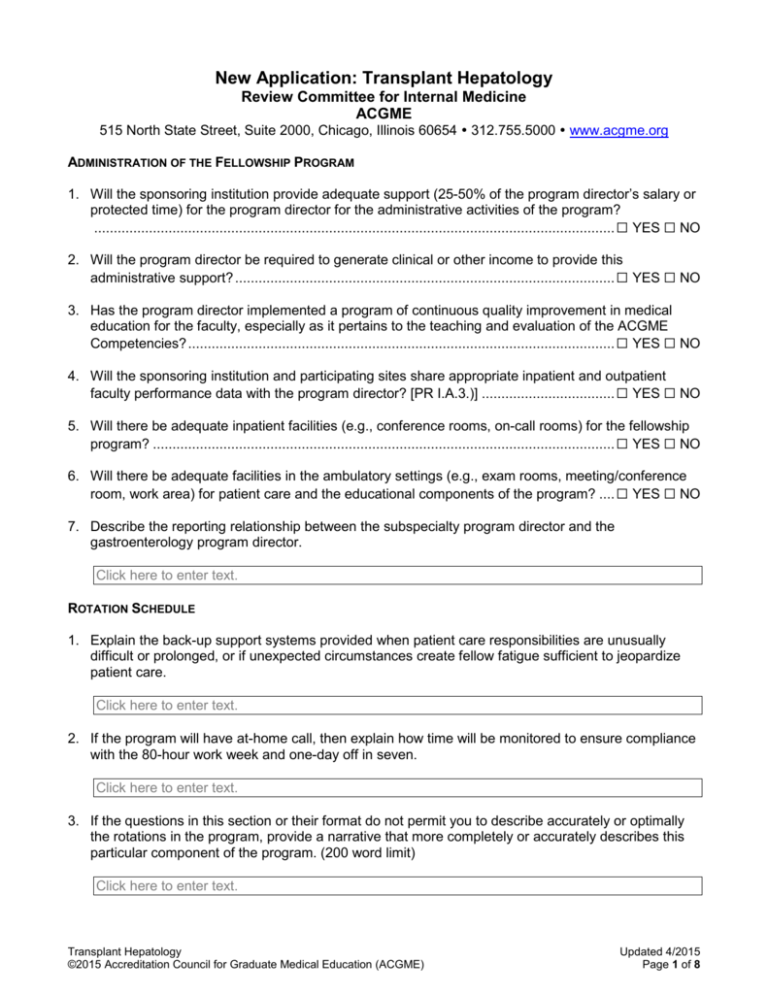
New Application: Transplant Hepatology Review Committee for Internal Medicine ACGME 515 North State Street, Suite 2000, Chicago, Illinois 60654 312.755.5000 www.acgme.org ADMINISTRATION OF THE FELLOWSHIP PROGRAM 1. Will the sponsoring institution provide adequate support (25-50% of the program director’s salary or protected time) for the program director for the administrative activities of the program? ..................................................................................................................................... ☐ YES ☐ NO 2. Will the program director be required to generate clinical or other income to provide this administrative support? ................................................................................................. ☐ YES ☐ NO 3. Has the program director implemented a program of continuous quality improvement in medical education for the faculty, especially as it pertains to the teaching and evaluation of the ACGME Competencies? ............................................................................................................. ☐ YES ☐ NO 4. Will the sponsoring institution and participating sites share appropriate inpatient and outpatient faculty performance data with the program director? [PR I.A.3.)] .................................. ☐ YES ☐ NO 5. Will there be adequate inpatient facilities (e.g., conference rooms, on-call rooms) for the fellowship program? ...................................................................................................................... ☐ YES ☐ NO 6. Will there be adequate facilities in the ambulatory settings (e.g., exam rooms, meeting/conference room, work area) for patient care and the educational components of the program? .... ☐ YES ☐ NO 7. Describe the reporting relationship between the subspecialty program director and the gastroenterology program director. Click here to enter text. ROTATION SCHEDULE 1. Explain the back-up support systems provided when patient care responsibilities are unusually difficult or prolonged, or if unexpected circumstances create fellow fatigue sufficient to jeopardize patient care. Click here to enter text. 2. If the program will have at-home call, then explain how time will be monitored to ensure compliance with the 80-hour work week and one-day off in seven. Click here to enter text. 3. If the questions in this section or their format do not permit you to describe accurately or optimally the rotations in the program, provide a narrative that more completely or accurately describes this particular component of the program. (200 word limit) Click here to enter text. Transplant Hepatology ©2015 Accreditation Council for Graduate Medical Education (ACGME) Updated 4/2015 Page 1 of 8 FOLLOW-UP/OUTPATIENT EXPERIENCES 1. Provide information for the fellows’ follow-up/outpatient experience and patient distribution. List each experience indicating the name of the experiences (e.g., Follow-up Clinic, Other), site number, duration of the experience, number of half-day sessions per week, whether faculty supervision is provided for each experience, and the percent of female patients. Add rows as necessary. Name of Experience Site # Duration On-site Average # of concurrent Patients faculty Sessions Seen Per supervision Per Week Session present? % Female Patients 2. Provide a narrative which describes how fellows gain experience in the longitudinal care of patients seen in consultation. Click here to enter text. RESEARCH AND SCHOLARLY ACTIVITY What percent of the fellows’ education is devoted to research and scholarly activities (either concurrent with clinical experience, or in blocks)? ........................................................................................... [ # ] % EVALUATION Provide information on the program director’s methods for evaluating fellows, teaching attendings and other faculty members, recording methods, access rules, and follow-up actions taken to remediate problems. Fellow Evaluation 1. Will faculty members always provide the program director with written evaluations of the fellow’s performance? ................................................................................................................ ☐ YES ☐ NO 2. Will the program director review fellow procedure logs in order to document that each fellow has performed the minimum number and achieved competence in invasive procedures? ... ☐ YES ☐ NO Fellow Evaluation Narrative 1. Describe the method for assessment of procedural competence. Click here to enter text. Transplant Hepatology ©2015 Accreditation Council for Graduate Medical Education (ACGME) Updated 4/2015 Page 2 of 8 2. Describe the process for reviewing program goals and objectives, and the effectiveness with which they are achieved Click here to enter text. Faculty Evaluation 1. Will faculty members evaluated by the fellows whom they supervise at the end of each rotation? ..................................................................................................................................... ☐ YES ☐ NO 2. Will these evaluations be written and confidential? ....................................................... ☐ YES ☐ NO 3. Will the results of these evaluations communicated on a regular basis, at least annually, to faculty members? ..................................................................................................................... ☐ YES ☐ NO MEDICAL RECORDS 1. Will clinical records that document both inpatient and ambulatory readily available at all times? .................................................................................................................................... ☐ YES ☐ NO 2. Will fellows have access to an electronic health record? ............................................... ☐ YES ☐ NO FACILITIES AND RESOURCES 1. Use the site number as it appears in ADS. Site #1 Site #2 Number of liver transplants # # performed each year Number of liver biopsies # # performed each year Number of allograft liver biopsies performed each # # year UNOS-approved transplant ☐ YES ☐ NO ☐ YES ☐ NO program? Interventional radiology facilities to: Perform balloon ☐ YES ☐ NO ☐ YES ☐ NO angioplasty? Perform Transjugular Intrahepatic Portal Systemic ☐ YES ☐ NO ☐ YES ☐ NO Shunt? Accredited programs in: Internal Medicine? ☐ YES ☐ NO Gastroenterology? ☐ YES ☐ NO Site #3 Site #4 Site #5 # # # # # # # # # 2. Interactions with Other Disciplines a) Will fellows and faculty share patient co-management responsibilities with transplant surgeons from the pre-operative phase to the outpatient period? ........................................... ☐ YES ☐ NO Transplant Hepatology ©2015 Accreditation Council for Graduate Medical Education (ACGME) Updated 4/2015 Page 3 of 8 b) Will the program ensure close interactions and education with an experienced liver transplant pathologist? ............................................................................................................. ☐ YES ☐ NO c) Will the program use a multidisciplinary approach to issues in donor selection and evaluation and in recipient criteria? .......................................................................................... ☐ YES ☐ NO EDUCATIONAL PROGRAM 1. Will the overall goals and objectives distributed to faculty and fellows annually?........... ☐ YES ☐ NO 2. Will the goals and objectives reviewed by the fellows at the start of each new rotation/assignment? ..................................................................................................................................... ☐ YES ☐ NO Patient Care Will the program provide experience for fellows to demonstrate competence in the following: 1. comprehensive management of critically ill patients awaiting transplant with complications including: a) b) c) d) e) refractory ascites ..................................................................................................... ☐ YES ☐ NO hepatic hydrothorax ................................................................................................. ☐ YES ☐ NO hepatorenal syndrome............................................................................................. ☐ YES ☐ NO hepatopulmonary and portal pulmonary syndromes ................................................ ☐ YES ☐ NO refractory portal hypertensive bleeding .................................................................... ☐ YES ☐ NO 2. diagnosis and management of hepatocellular carcinoma and cholangiocarcinoma including transplantation, non-transplantation, surgical and non-surgical approaches? ................ ☐ YES ☐ NO 3. ethical considerations relating to liver transplant donors including questions related to living donors, non-heart beating donors, criteria for brain death, and appropriate selection of recipients? ..................................................................................................................................... ☐ YES ☐ NO 4. prevention, evaluation and management of acute and chronic end stage liver? ............ ☐ YES ☐ NO 5. management of chronic viral hepatitis in the pre-, peri- and post-transplantation settings? ..................................................................................................................................... ☐ YES ☐ NO 6. management of fulminant liver failure? .......................................................................... ☐ YES ☐ NO 7. nutritional support of patients with liver disease? .......................................................... ☐ YES ☐ NO 8. psychosocial evaluation of transplant candidates, in particular those with history of substance abuse? ......................................................................................................................... ☐ YES ☐ NO 9. use of interventional radiology in diagnosis and management of portal hypertension, as well as biliary and vascular complications? ............................................................................... ☐ YES ☐ NO Medical Knowledge Will the program provide experience for fellows to demonstrate knowledge of the following: Transplant Hepatology ©2015 Accreditation Council for Graduate Medical Education (ACGME) Updated 4/2015 Page 4 of 8 1. the pathogenesis, manifestations, and complications of end-stage liver disease and hepatic transplantation, including the behavioral adjustments of patients to their problems? ..... ☐ YES ☐ NO 2. anatomy, physiology, pharmacology, pathology, and molecular virology related to the liver and biliary tract? .................................................................................................................. ☐ YES ☐ NO 3. drug hepatotoxicity and the interaction of drugs with the liver?...................................... ☐ YES ☐ NO 4. the impact of various modes of therapy and the appropriate use of laboratory tests and procedures? ..................................................................................................................................... ☐ YES ☐ NO 5. natural history of chronic liver disease? ........................................................................ ☐ YES ☐ NO 6. principles and application of artificial liver support? ....................................................... ☐ YES ☐ NO 7. principles of donor selection and rejection (e.g., hemodynamic management, donor organ steatosis, and indication for liver biopsy) ? .................................................................................... ☐ YES ☐ NO 8. principles of living donor selection, including surgical, psychosocial and ethical considerations? ..................................................................................................................................... ☐ YES ☐ NO 9. principles and practice of pediatric liver transplantation?............................................... ☐ YES ☐ NO 10. transplant immunology including blood group matching, histocompatibility, tissue typing and malignant complications of immunosuppression? ......................................................... ☐ YES ☐ NO 11. indications, contraindications and complications of liver allograft biopsies? .................. ☐ YES ☐ NO Practice-Based Learning and Improvement 1. Describe an example of a learning activity in which fellows will develop competency in systematically analyzing practice using quality improvement methods, and implement changes with the goal of practice improvement. Click here to enter text. 2. Describe one example of a learning activity in which fellows will engage to develop the skills needed to locate, appraise, and assimilate evidence from scientific studies related to their patients’ health problems. Click here to enter text. Interpersonal and Communication Skills 1. Describe one learning activity in which fellows will develop competence in communicating effectively with patients, their families, and health professionals Click here to enter text. Transplant Hepatology ©2015 Accreditation Council for Graduate Medical Education (ACGME) Updated 4/2015 Page 5 of 8 2. Will the program use both direct observation and multi-source evaluation, including patients, peers, and non-physician team members, to assess fellow performance in communication with patients and families? ................................................................................................................. ☐ YES ☐ NO 3. Will the program use both direct observation and multi-source evaluation, including patients, peers, and non-physician team members, to assess fellow performance in teamwork? ........... ☐ YES ☐ NO 4. Will the program use both direct observation and multi-source evaluation, including patients, peers, and non-physician team members, to assess fellow performance in communication with peers, including transitions of care? ......................................................................................... ☐ YES ☐ NO 5. Will the program use both direct observation and multi-source evaluation, including patients, peers, and non-physician team members, to assess fellow performance in record keeping? ... ☐ YES ☐ NO Professionalism 1. Describe at least one learning activity, other than lecture, by which fellows will develop a commitment to carrying out professional responsibilities and an adherence to ethical principles. Click here to enter text. 2. How will the program promote professional behavior by the fellows and faculty? Click here to enter text. 3. Will the program use multi-source evaluation, including patients, peers, and non-physician team members, to assess each fellow’s honesty and integrity? ............................................. ☐ YES ☐ NO 4. Will the program use multi-source evaluation, including patients, peers, and non-physician team members, to assess each fellow’s ability to meet professional responsibilities? ............ ☐ YES ☐ NO 5. Will the program use multi-source evaluation, including patients, peers, and non-physician team members, to assess each fellow’s ability to maintain appropriate professional relationships with patients and colleagues? .............................................................................................. ☐ YES ☐ NO 6. Will the program use multi-source evaluation, including patients, peers, and non-physician team members, to assess each fellow’s commitment to self-improvement?........................... ☐ YES ☐ NO Systems-based Practice 1. Describe the settings and learning activities in which fellows will gain an awareness of and responsiveness to the larger context and system of health care, as well as the ability to call effectively on other resources in the system to provide optimal health care. Click here to enter text. 2. Will the program use multi-source evaluation, including peers and non-physician team members, to assess each fellow’s ability to provide care coordination, including transition of care? ..................................................................................................................................... ☐ YES ☐ NO Transplant Hepatology ©2015 Accreditation Council for Graduate Medical Education (ACGME) Updated 4/2015 Page 6 of 8 3. Will the program use multi-source evaluation, including peers and non-physician team members, to assess each fellow’s ability to work in interdisciplinary teams? ..................................... ☐ YES ☐ NO 4. Will the program use multi-source evaluation, including peers and non-physician team members, to assess each fellow’s advocacy for quality of care? ....................................................... ☐ YES ☐ NO 5. Will the program use multi-source evaluation, including peers and non-physician team members, to assess each fellow’s ability to identify system problems and participate in improvement activities? ..................................................................................................................................... ☐ YES ☐ NO Competency Evaluation Narrative If the questions in the competency sections or their format do not permit you to describe accurately or optimally the program director’s evaluation method(s) of fellows in any of the competencies listed above, provide a narrative that more completely or accurately describes the evaluation method(s). Click here to enter text. Curriculum Organization and Fellow Experiences Didactic Program 1. Will fellows routinely participate in the following: a) b) c) d) e) f) core curriculum conference series? ......................................................................... ☐ YES ☐ NO clinical case conferences?....................................................................................... ☐ YES ☐ NO journal club? ............................................................................................................ ☐ YES ☐ NO research conferences? ............................................................................................ ☐ YES ☐ NO morbidity and mortality conferences? ...................................................................... ☐ YES ☐ NO quality improvement conferences? .......................................................................... ☐ YES ☐ NO 2. Will faculty members participate in required conferences? ............................................ ☐ YES ☐ NO Didactic Program Narrative 1. Briefly describe the Core Curriculum Conference Series in the program. Click here to enter text. 2. Describe how the program will ensure that the fellows have the opportunity to make up missed core conferences (e.g., when off-site). Click here to enter text. 3. Describe the program’s teaching rounds; including the frequency and duration spent per week. Click here to enter text. 4. Describe how faculty and fellows will be educated about fatigue and its negative effects. Click here to enter text. Transplant Hepatology ©2015 Accreditation Council for Graduate Medical Education (ACGME) Updated 4/2015 Page 7 of 8 Fellow Experiences 1. Will each fellow participate in the primary evaluation, presentation and discussion of at least 10 potential transplant candidates? .................................................................................... ☐ YES ☐ NO 2. Will each fellow provide follow-up for at least 20 new liver transplant recipients for a minimum of 3 months from the time of transplantation? ...................................................................... ☐ YES ☐ NO 3. Will each fellow participate in the follow-up of 20 or more liver transplant recipients 1 year posttransplant? .................................................................................................................... ☐ YES ☐ NO 4. Will each fellow provide a minimum of six month follow-up for each of these liver transplant patients? ....................................................................................................................... ☐ YES ☐ NO 5. Will each fellow actively participate in the transplant recipients’ medical care including the management of acute cellular rejection, recurrent disease, infectious diseases and biliary tract complications? .............................................................................................................. ☐ YES ☐ NO 6. Will each fellow serve as the primary member of the transplantation team?.................. ☐ YES ☐ NO 7. Will each fellow acquire a working knowledge of the organizational and logistic aspects of liver transplantation including the role of nurse coordinators and other support staff, organ procurement, and UNOS policies? ...................................................................................................... ☐ YES ☐ NO 8. Will each fellow participate in making decisions about immunosuppression? ................ ☐ YES ☐ NO 9. Will each fellow participate as an observer in one cadaveric donor procurement and three liver transplant surgeries?..................................................................................................... ☐ YES ☐ NO If the answer to any of the above Fellow Experience questions is no, explain. Click here to enter text. Transplant Hepatology ©2015 Accreditation Council for Graduate Medical Education (ACGME) Updated 4/2015 Page 8 of 8
